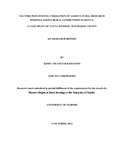| dc.description.abstract | Agriculture is the backbone of development of rural communities. Generally, agricultural
research efforts aim at contributing to existing knowledge and improving the quality of life.
Within the study area, most of agricultural researches conducted have mainly majored on
assessment of biodiversity and traditional high yield crops. Despite the numerous research efforts
made in Yatta division, agricultural production remains low with poverty levels remaining
significantly high. The purpose of this study was to establish the factors influencing utilization of
agricultural research findings in Yatta Division. The findings of this study are an indispensable
tool to different players in the agricultural sector such as; the government in policy formulation,
community members in enhancing crop yields, development practitioners in adding to the
existing knowledge on utilization of agricultural research findings and researchers in identifying
new areas for further research. The study adopted an ex post facto design with the target
population consisting of 21,000 small scale farmers, division agricultural officer, division
agricultural extension officer, three location agricultural extension officers, and researchers in
Yatta division. The sample size was composed of 178 small scale farmers, one division
agricultural officer, one division agricultural extension official, three location agricultural
extension officers, and four researchers. Cluster sampling was used in selecting a sample of 178
small scale farmers while Judgmental sampling was used in selecting researchers and agricultural
offices. Data collected from the field was processed through data cleaning/editing, then
categorized and coded to get themes and patterns for further analysis. Analysis was performed by
use of SPSS for Quantitative data while relational content analysis was used for qualitative data.
The analyzed data was presented by use of narrative reports, pie-chart, tables, percentages and
graphs. The study results revealed that poverty accounting for 57.6 (%) of the respondents
earning less than Kshs 5,000 and illiteracy at 46.8 (%) were the major factors influencing the
utilization of research results in improving crop production. Other significant factors included;
female headed households, lack of adequate research findings and language barriers. To enhance
utilization of research findings by rural communities, the study recommends the involvement of
community members in the generation and consumption of research findings through
sensitization using mass media such as the vernacular radio stations, and simple accessible
technologies such as mobile phones. | en_US |

